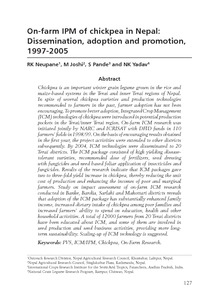On-farm IPM of chickpea in Nepal dissemination, adoption and promotion, 1997-2005
Abstract
Chickpea is an important winter grain legume grown in the rice and maize-based systems in the Terai and inner Terai regions of Nepal. In spite of several chickpea varieties and production technologies recommended to farmers in the past, farmer adoption has not been encouraging. To promote better adoption, Integrated Crop Management (ICM) technologies of chickpea were introduced in potential production pockets in the Terai/inner Terai region. On-farm ICM research was initiated jointly by NARC and ICRISAT with DFID funds in 110 farmers 'fields in 1998/99. On the basis of encouraging results obtained in the first year, the project activities were extended to other districts subsequently. By 2004, ICM technologies were disseminated to 20 Terai districts. The ICM package consisted of high yielding disease-tolerant varieties, recommended dose of fertilizers, seed dressing with fungicides and need based foliar application of insecticides and fungicides. Results of the research indicate that ICM packages gave two to three-fold yield increase in chickpea, thereby reducing the unit cost of production and enhancing the incomes of poor and marginal farmers. Study on impact assessment of on-farm ICM research conducted in Banke, Bardia, Sarlahi and Mahottari districts reveals that adoption of the ICM package has substantially enhanced family income, increased dietary intake of chickpea among poor families and increased farmers' ability to spend on education, health and other household activities. A total of 12000 farmers from 20 Terai districts have been educated about ICM, and some of them are involved in seed production and seed business activities, providing more long-term sustainability. Scaling-up of ICM technology is suggested

